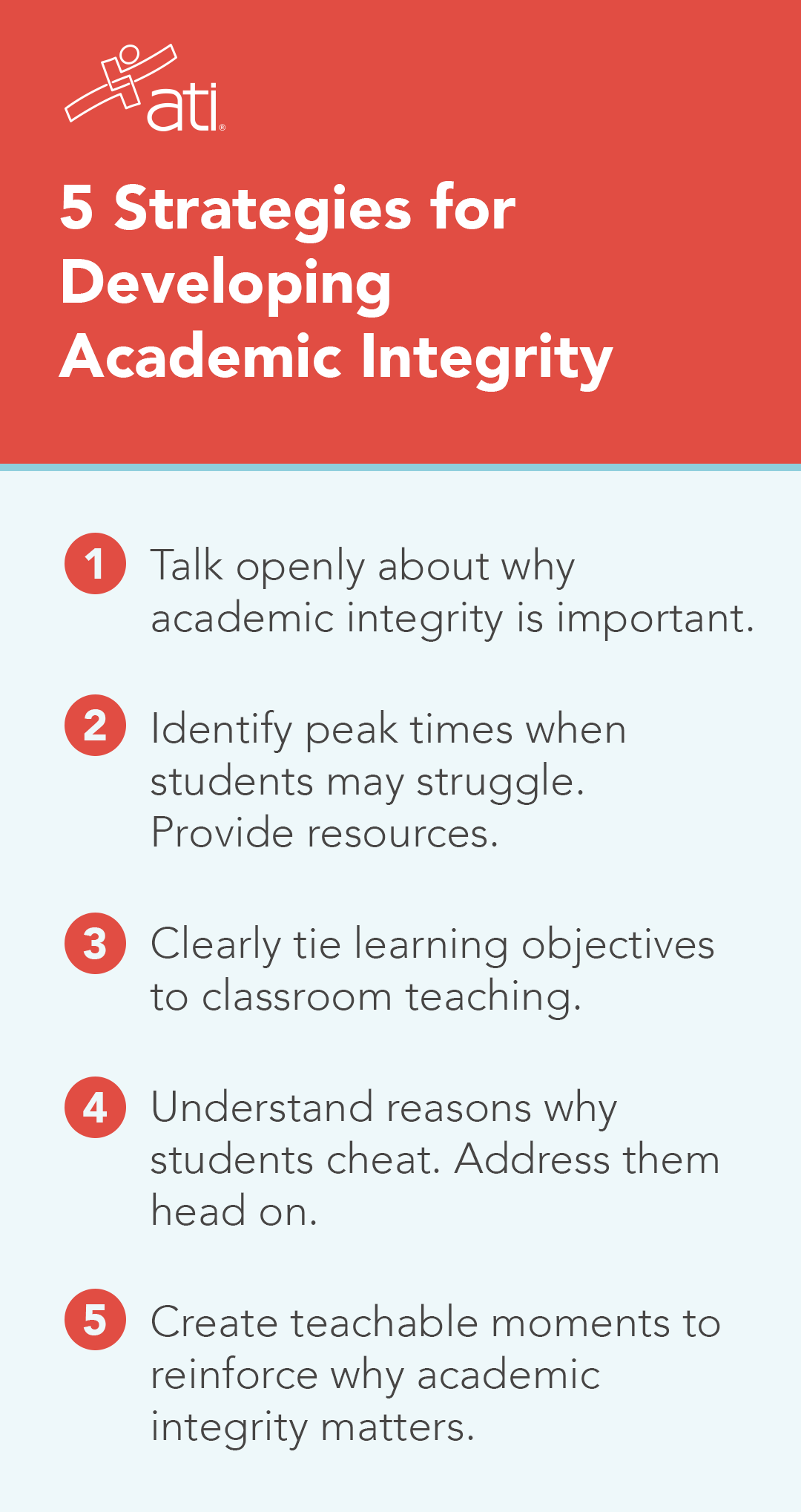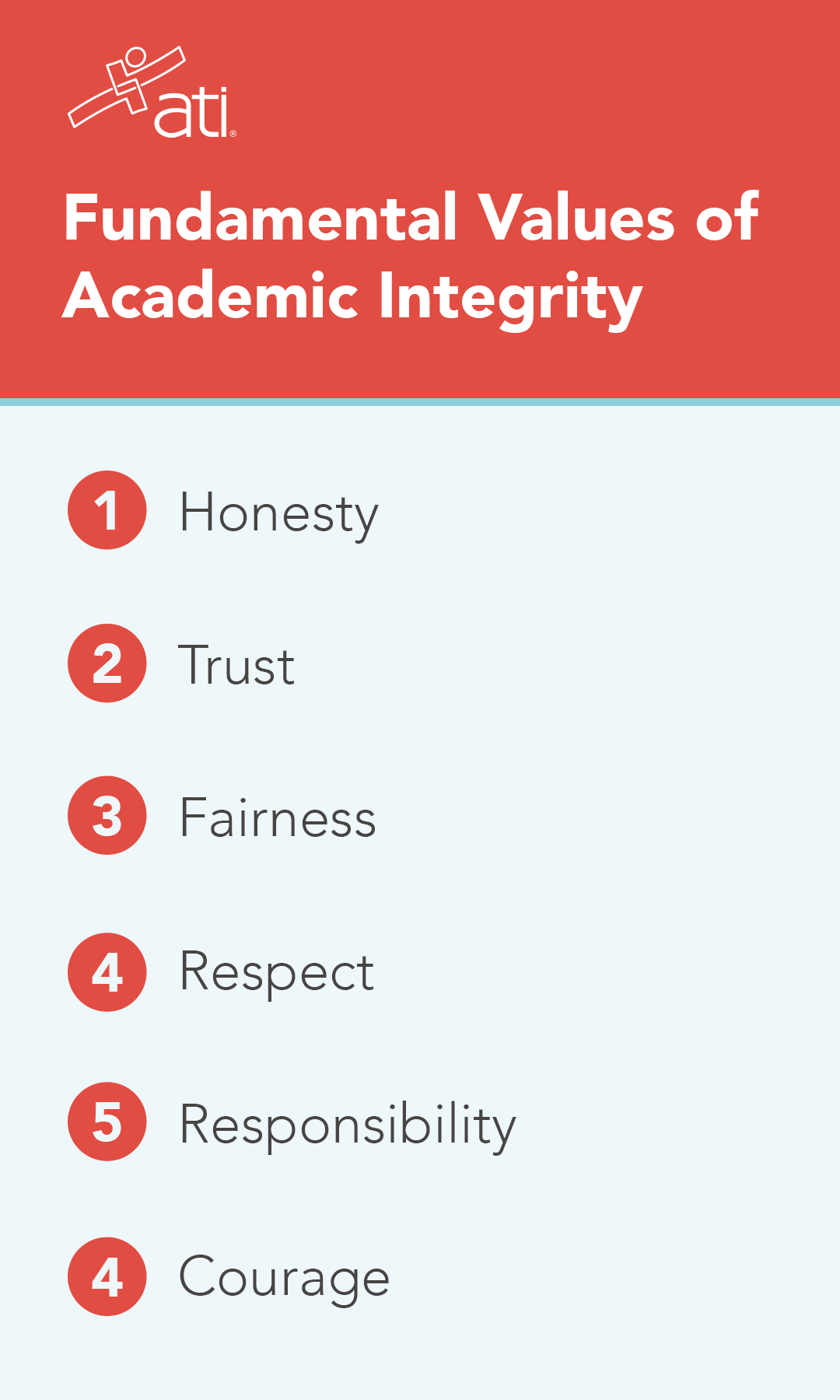Why You Should Make Academic Integrity Part of Classroom Teaching
How Nursing Programs Can Deter Cheating and Develop Well-Prepared, Ethical Nurses
Cheating may be silent, but its consequences reverberate loudly — especially in nursing. Teaching ethical behaviors is foundational to preparing competent, trustworthy nursing professionals. That’s why academic integrity should be a component of every nursing curriculum.
But teaching students about academic integrity doesn’t fit neatly into a syllabus. It can’t be captured in an assignment because it is a culture to be instilled and developed. What’s a program to do?
This article explores current thinking about academic integrity and provides strategies to help nurse educators model and mentor the behaviors that define it. By expanding the focus on cheating behavior to incorporate integrity-centered learning, nursing programs can deter academic dishonesty and develop well prepared, ethical nurses.
Connect With Resources to Help Teach Academic Integrity
What Is Academic Integrity and Why Should Nursing Students Care About It?
The International Center for Academic Integrity (ICAI) describes academic integrity as a commitment to 6 fundamental values: honesty, trust, fairness, respect, responsibility, and courage.1 This commitment is honored even when circumstances are difficult, the definition states.
These values continue to be important long after a student graduates, said Jennie Miron, BScN, MSc, PhD, Reg.N, a nurse educator who is a member of the ICAI Board of Directors.
Dr. Miron, who has focused on academic integrity issues for the past 18 years, serves as academic integrity lead faculty at the School of Health & Life Sciences at Humber Polytechnic in Toronto. She said developing academic integrity in nursing students is especially important because of the requirements of nursing practice.
“Academic integrity is so much more than academic behaviors — it encompasses the professional behaviors students will take into their careers,” she said.
Bonnie Ross, EdD, RN, CNE, a nurse educator who provides support to academic nursing programs as a product content strategist for ATI, says that nursing faculty are instrumental in establishing the foundation for academic integrity.
“Academic integrity is core to the profession. It is very much about students’ learning, practicing, demonstrating, and ultimately incorporating integrity and accountability into their practice, leading to safe and effective patient care,” Dr. Ross said. “This is encompassed in our professional identity as a nurse — and nursing faculty are role models for this.”
To help instill academic integrity in nursing students, Dr. Miron said it’s essential to help them understand why they must learn course content “in a way that's honest.” At the same time, faculty should leave room for learning from missteps.
“It's also important for students to recognize that they might make a mistake,” she said. “And if that happens, the most important thing is to come forward, to reflect on what they’ve done, and to understand the implications.”
This type of response may sound surprising, but it’s a reflection of new approaches to academic dishonesty.
What Is the Current Thinking on Academic Integrity in Higher Education?
Today’s understanding of academic integrity grew out of educators’ dissatisfaction with punitive approaches to academic infractions. Donald McCabe, PhD, a longtime business professor at Rutgers, is credited with shifting the thinking from “catching cheaters” to cultivating ethical professionals.
“If we truly believe in our role as educators, we would do better to view most instances of cheating as educational opportunities,” he wrote in an essay published in in 2005.
Dr. McCabe performed the first studies of academic dishonesty and later founded ICAI. The organization and its members continue to research cheating behaviors and academic integrity.
“As our thinking has evolved, we’ve come to appreciate that there's a developmental piece that goes along with our students maturing into the professionals we want them to be,” Dr. Miron said of the research community focused on academic integrity.
“Some of that development is going to involve them making mistakes, so the thinking is much more about prevention of misconduct and promotion of the values that we want students to manage.”
What Factors Contribute to Cheating Behaviors in Nursing Students?
The shift in viewpoint on cheating from punitive to preventive is gaining traction for many reasons. A prominent one is that research shows cheating is a reflection of countless, often complex factors influencing a student’s behavior. When faculty recognize these factors and emphasize early and often why academic integrity is foundational to learning, the student trajectory can change, Dr. Miron said.
Although reports of cheating are headline grabbers, it’s hard to accurately quantify this behavior. As the Chronicle of Higher Education reported in 2024, definitive data is limited and studies typically rely on self-reporting by students.2
An important element of cheating prevention is understanding why students do it. Research has identified common triggers,3,4 which include:
- stress
- low self-efficacy
- peer behavior
- disconnection from course material.
A literature review4 published in 2024 found that increased pressure on students, poor awareness or understanding of academic integrity, outdated academic honor codes, and unethical application of AI are also factors in cheating.
Another contributor is the sometimes flawed nature of human judgment. In an episode of the podcast Teaching in Higher Ed, psychology professor David Rettinger, PhD, noted that cheating sometimes stems from momentary tradeoffs — decisions made under pressure that seem justifiable at a specific point in time.
Dr. Rettinger is director of the undergraduate psychology program at the University of Tulsa and a coauthor of The Opposite of Cheating: Teaching for Integrity in the Age of AI. This book presents “a positive and practical guide to academic integrity” and asks academic programs to consider focusing on supporting learning instead of stopping cheating.
To address the factors that can lead a student to cheat, Dr. Miron recommends that nursing faculty have direct conversations about the issues that contribute to academic dishonesty. By normalizing discussions about cheating, students can gain a level of clarity that might help them resist it.
“In nursing, we should be freely talking about cheating because we're really trying to shape knowledge and judgment skills they will use in their careers,” Dr. Miron said.
Even when trust between faculty and student is breached, rebuilding is possible. “An honest approach to learning will support learning — and that's what we have to get the students to understand,” Dr. Miron said.
This doesn’t mean that a faculty member won’t be disturbed by a cheating infraction, however.
“The very first thing they feel is angry and disappointed in that student,” Dr. Miron said. “ … it feels very personal, and it feels really disappointing. But more importantly, the student has lost the learning for whatever they took the shortcut on.”
Dr. Miron said it’s vital to help students comprehend that by cheating, they are doing a disservice to themselves. She recommends frequently reminding students that their journey in a nursing program is purposefully difficult because it is built specifically to get them to their goal. “There are no shortcuts,” she said.
Ready to Curtail Cheating? Find Out How
How Can Nursing Programs Discourage and Prevent Cheating?
To discourage cheating, Dr. Miron recommends normalizing struggle and failure as part of learning, building strong student-instructor relationships, and providing open channels for communication and support.
Dr. Miron and other published authors emphasize that nursing programs should take steps that are feasible to implement and sustain. Based on these recommendations, we’ve outlined 5 actionable strategies to promote academic integrity and decrease cheating. Download these tips to share with colleagues.

How Can Nursing Programs Best Instill Academic Integrity & Accountability?
One of the most effective ways to help students grasp the principles of academic integrity is to engage them in learning opportunities that help them gain real-life perspective.
“The literature suggests that being proactive and engaging is effective,” Dr. Ross said. “This means providing a positive approach to academic integrity using active teaching and learning techniques.”
 She said students and faculty can benefit from ATI resources that simultaneously educate and engage.
She said students and faculty can benefit from ATI resources that simultaneously educate and engage.
For students, these resources include: Launch: Nursing Academic Readiness®, Civility Mentor, The Engage® Series, Nurse's Touch™️ Suite and Skills Modules.
For Faculty, these resources include consulting services focused on faculty development and classroom management and continuing education courses in ATI Academy.
How can Nursing Programs Ensure That Exams & Questions Are Secure?
Even in the presence of strong academic integrity policies, no program should be without a strong defense against cheating. One of the most effective ways to identify and deter dishonest activity is to partner with an exam provider that protects its contents from current and newly developing threats.
ATI provides this protection on multiple levels, through practices and policies collectively described as SecureATI. Using a multilayered defense approach, the ATI security team works alongside more than 600 nurse educators, psychometricians, and test developers to assure the security of exams and questions.
In addition, ATI’s three-part approach to question and test security prevents the sharing and circulation of questions outside the testing environment. Specifically, ATI updates content frequently, refreshes content often, and incorporates testing features that make it difficult for students to cheat.
Specific features of ATI’s secure questions and test banks include:
- continuous updates that maximize reliability and predictability of results
- randomized exam delivery via a proprietary distribution system
- real-time tracking of student progress throughout an assessment
- consistent threat research and testing
- flagging of cheating events in real time to counter all new threats
- proctors who complete certification and adhere to ATI testing policies
- 24/7 web and social media monitoring to eliminate potential threats
- quick action and legal consequences where needed
- partnerships with law enforcement agencies.
Building Ethical Nurses, One Step at a Time
Academic integrity isn’t just a policy — it’s an educational strategy to ensure that future nurses will practice ethically and competently.
By fostering a culture of honesty, trust and responsibility, nurse educators can prepare more students to succeed and thrive in their careers. Through open dialogue, compassionate accountability, and thoughtful assessment design, programs can help students live the values that define both academic and clinical excellence.
References
- International Center for Academic Integrity. Fundamental values. https://www.academicintegrity.org/aws/ICAI/pt/sp/values
- McMurtrie B. Cheating Has Become Normal. Faculty members are overwhelmed, and the solutions aren’t clear. Chronicle of Higher Education, 2025. https://www.chronicle.com/article/cheating-has-become-normal
- Mousavi SK. Explaining reasons for cheating in exams among undergraduate nursing students: A qualitative study. BMC Medical Education. 2025;1075. https://doi.org/10.1186/s12909-025-07693-8
- Sozon M, Alkharabsheh OHM, Fong PW, Chuan SB. Cheating and plagiarism in higher education institutions: A literature review. F1000 Research. 2024;13:788.https://pmc.ncbi.nlm.nih.gov/articles/PMC11489843/
- Miles PJ, Campbell M, Ruxton GD. Why Students Cheat and How Understanding This Can Help Reduce the Frequency of Academic Misconduct in Higher Education: A Literature Review. Journal of Undergraduate Neuroscience Education. 2022;20(2):A150-A160. doi: 10.59390/LXMJ2920


